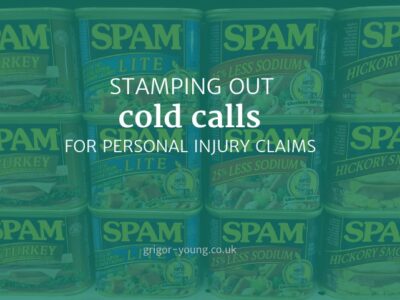Between 1937 and 1994, if you used the word ‘spam’, people would understand you to mean a form of tinned pork.
It was useful for feeding soldiers during the Second World War, because it could be eaten straight out of the can.
No agreed origin of the name exists. An acronym (or similar contraction) is likely – e.g. ‘SPiced hAM’ or ‘Shoulders of Pork and Ham’.
The physical product still exists and apparently passed 7 billion sales in 2007.
Monty Python’s famous sketch from 1970 portrayed the canned meat as all-pervading and unavoidable. The chanting of the word drowns out all other dialogue.
Where ‘spam’ is now
With the rise of the Internet, the Monty Python definition of the word has become its primary meaning.
Merriam-Webster online dictionary defines spam as ‘unsolicited, usually commercial, e-mail sent to a large number of addresses’.
The breadth of topics to which the term applies has continued to expand.
Personal injury claims and spam
In relation to personal injury claims, we have all suffered the harrassment of unsolicited texts and cold calls – ‘spam’.
Two years after we were involved in a minor road traffic accident, my family is still receiving periodic calls from claims management companies – sometimes as many as 3 calls consecutively.
These tactics risk exploiting vulnerable people. They also create the false perception that it’s ‘easy’ to get compensation for personal injury.
One – apparently genuine – post-accident enquiry via our website asked whether the fact that a cold caller was offering to initiate a personal injury claim for them somehow ‘created’ a right to compensation even though they had not been injured at all. (In case you’re wondering, the answer is a resounding ‘no’).
Cold calls for personal injury claims targeted by campaign by APIL
Complaints about personal injury cold calls increased by a whopping 45% from 2014 to 2015.
Against this backdrop, the Association of Personal Injury Lawyers (APIL) has launched a campaign, on 01 June 2016, to Can The Spam.
The aim is to amass the quality and quantity of data required to convince the Westminster Government that Claims Management Companies should be constrained in the same way as solicitors.
The use of spam phone calling and spam texting to generate personal injury claim business should be prohibited across the board.
How can you get involved?
If you have had an unwanted text or call about a personal injury claim, you can get in touch with APIL.
They would like as much of the following information as possible:
- Was it a text or a call you received?
- When did you receive the text/call?
- Did you receive an automated message or did a person contact you?
- If you got the name of the company that called you, what was that?
- What was the phone number from which any call was made – or was it withheld?
APIL will collate the data and report it to the Information Commissioner’s Office (ICO). Note that the ICO may need your personal details during its investigation into your experience so you will need to let APIL know if they have your permission to pass on your contact information.
APIL’s video in conjunction with the campaign
APIL’s contact details for CanTheSpam
Twitter: @APILCanTheSpam
Facebook: www.facebook.com/canthespam
Email: canthespam@apil.org.uk
Phone: 0115 943 5416
How we can help
If you have any questions about this article or any aspect of our personal injury claims services, please contact us on 01343 544077 or send us a Free Online Enquiry.
The home page of our dedicated personal injury claims website, Moray Claims, has a one-and-a-half-minute-long video explaining the types of ‘self-help’ information available there.


